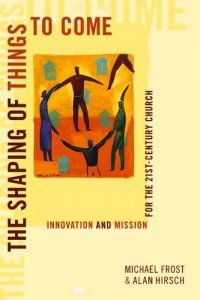My top ten books on theology and ministry (2)
 Guest post by Eddie Arthur of Wycliffe Bible Translators and Global Connections
Guest post by Eddie Arthur of Wycliffe Bible Translators and Global Connections
A few weeks back, Ian asked which were the ten books that had shaped your life and ministry building. Over the years, I've posted diverse lists of the best books on mission and missiology on my ain weblog, but I've never really pondered which ones have had the biggest impact on me. And so I decided to take upwardly Ian's challenge.
Before getting to the actual books, it's probably worth saying something about who I am and what I do. I'm hardly a household proper name—even in my own household! I've been a Christian since my mid teens; that's a little over forty years, now (which makes me feel very old). After a spell working equally a enquiry botanist, I joined Wycliffe Bible translators in the 1980s. Nosotros spent six years living in a pocket-size village in Ivory Declension as part of the team translating the Scriptures into the Kouya langage and since so, I've been involved in various leadership roles in Africa and the UK. Terminal year, I stood down as Executive Director of Wycliffe and I'm now working for Global Connections and studying for a PhD. On to the books…
I doubtable that my life may have taken a very different class if I had not readThrough Gates of Splendour by Elizabeth Elliot shortly later on becoming a Christian. Over the years I've read many missionary biographies, only none of them have had the bear upon that this ane did. It should exist compulsory reading for all new Christians!
Reading was very much a part of my Christian formation. When I went to Academy, my Pastor sent me a new book every month, generally something mind-stretching from Banner of Truth. However, the next book to really stick out was one that I bought myself—I Believe in Preaching by John Stott. In my early on twenties, I received a few invitations to preach in modest churches and I decided that I'd ameliorate acquire how to do information technology, then I bought a book. The thing that grabbed me nigh Stott'due south piece of work was the call to clearly communicate the message of the Bible in today's context. This was a radical divergence from the largely cerebral teaching that I was used to and has shaped much of what I have done. I meet Bible translation every bit existence i obvious outworking of Stott's approach to teaching the Scriptures.
Towards the stop of our time in Africa, a number of books started to make me re-evaluate the piece of work that I was doing. Translating the Message by Lamin Sanneh showed me that Bible Translation was far more than than simply finding a convenient mechanism for transmitting the Gospel message. The deed of translation empowers the church theologically and politically and diminishes the ongoing role of the missionary. Mission After Christendom by David Smith and Changing the Listen of Missions past Engel and Dyrness both made me start to question some of the means that missionary agencies went about their work. Has the model of William Carey and Hudson Taylor run its grade?
Perhaps the most important volume that I read during this period was The Adjacent Christendom by Philip Jenkins. This lays out very clearly the fashion in which the centre of gravity of the Christian world has moved from Europe and the US to Latin America, Africa and Asia. It was quite clear to me after reading this book that the mission earth needed a very drastic overhaul. What was less clear is what this overhaul should look like. In some ways, that's a question I'thou still asking.
 I found The Shaping of Things to Come by Frost and Hirsch to be fascinating. The authors wrestle with many of the same questions that I had been raising about mission work in rural Africa, only in the context of suburban Australia. It convinced me that cross-cultural missionaries and church leaders take a huge amount to acquire from each other, though there is an unwillingness to mind across the church-mission bulwark.
I found The Shaping of Things to Come by Frost and Hirsch to be fascinating. The authors wrestle with many of the same questions that I had been raising about mission work in rural Africa, only in the context of suburban Australia. It convinced me that cross-cultural missionaries and church leaders take a huge amount to acquire from each other, though there is an unwillingness to mind across the church-mission bulwark.
Over the final ten years or so, I've returned to studying some of the basics of my religion, things I terminal looked at in particular decades agone. Ii books in item have resonated deeply, pulling together threads of my reflection and experiences over the years and helping me to encounter things in new ways:Surprised by Hope by N T Wright; andDelighting in the Trinity by Tim Chester. I read dozens of books on the Trinity every bit function of writing an MA dissertation. Many of them were more erudite than Chester's book, but few set my heart on burn down the way his did.
The last book in my 10 hasn't yet had a deep affect on my life as information technology was just published last year. However, I believe that it will be the set text for cross-cultural missions study for years to come. I will certainly be turning to Goheen'south Introducing Christian Mission Today a neat bargain; I just wish I'd written it.
Time doesn't allow me to talk about Andrew Walls, Jim Packer and Christopher Wright and other luminaries who have had a huge impact on me. However, my large regret is that my list of ten books only includes one book by a not-Western writer.
Much of my work is washed on a freelance footing. If yous take valued this post, would you considerdonating £1.20 a month to support the product of this blog?
If you enjoyed this, exercise share it on social media (Facebook or Twitter) using the buttons on the left. Follow me on Twitter @psephizo. Like my folio on Facebook.
Much of my work is done on a freelance basis. If y'all have valued this post, y'all can make a unmarried or repeat donation through PayPal:
For other ways to support this ministry building, visit my Back up page.
Comments policy: Good comments that engage with the content of the post, and share in respectful argue, tin add real value. Seek first to understand, then to exist understood. Brand the most charitable construal of the views of others and seek to learn from their perspectives. Don't view contend equally a disharmonize to win; address the argument rather than tackling the person.
Source: https://www.psephizo.com/reviews/my-top-ten-books-on-theology-and-ministry-2/
0 Response to "My top ten books on theology and ministry (2)"
Enregistrer un commentaire